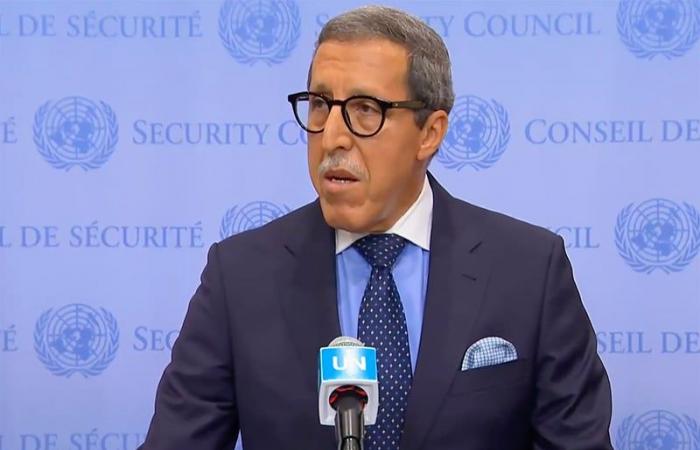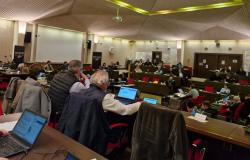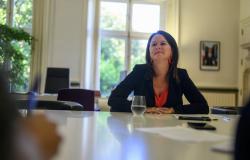The Kingdom of Morocco welcomed yesterday’s adoption of United Nations Security Council Resolution 2756, renewing the mandate of MINURSO and reaffirming the Moroccan proposal for autonomy for the Sahara. Omar Hilale, Morocco’s permanent representative to the UN, welcomed this adoption as an explicit response to Morocco’s expectations, confirming the preeminence of its initiative and recalling the growing support of the international community during the press conference held after the vote.
The text, which rejects the amendment attempts proposed by Algeria, underlines the role of this initiative as the one and only basis for achieving a lasting and peaceful solution.. With this resolution, the Security Council confirms for the seventeenth consecutive year the Moroccan autonomy proposal, qualifying the Kingdom’s efforts as “serious and credible”.
The autonomy solution, under Moroccan sovereignty, is supported by numerous member states and international organizations, including 20 European countries, permanent members of the Security Council, and more than a hundred states. “ This international dynamic reflects solid diplomatic progress in favor of Morocco », Underlined Hilale, adding that this support expresses global confidence in the capacity of this initiative to establish stability and prosperity in the Sahara.
Failure of Algerian attempts
The Security Council calls on all parties, including Algeria, to actively participate in the political process, deploring Algiers’ systematic obstruction of the resumption of the round tables. By expressly mentioning Algeria five times as a stakeholder, the resolution highlights its role in the current blockage. “ This text recalls that Morocco continues to move forward in a process of cooperation and dialogue, where some still prefer the status quo », affirmed Hilale. For the Security Council, the attitude of Algeria, which has refused for three years to resume round tables, is opposed to diplomatic efforts and the search for an international compromise.
Algeria attempted to introduce two amendments focused on human rights, but these maneuvers failed, once again revealing Algiers’ isolation on the international stage. In response, Ambassador Hilale did not fail to criticize the irony of the situation: “ How can a country like Algeria, which persecutes its opponents and represses even artists, claim to teach lessons in human rights? “. This diversion attempt, described as “ poorly scripted show », demonstrates, according to Hilale, Algiers’ desire to distract the Council from the essential: the viable political solution proposed by Morocco.
The text of the resolution also recognizes the Kingdom’s efforts in protecting human rights in the southern provinces, highlighting the role of the National Human Rights Council and its regional commissions in Laâyoune and Dakhla. The resolution also recalls the importance of cooperating with the Office of the United Nations High Commissioner for Human Rights and the obligation of transparency in the Tindouf camps in Algeria, by once again demanding the registration of Sahrawi refugees.
International confidence in the future of Moroccan diplomacy
At the same time, the Security Council expresses its concern for regional stability, emphasizing the importance of the ceasefire and condemning any action likely to compromise the negotiations. Morocco, with the support of several international powers, is engaged in a constructive approach to economic and social development in the Sahara, thus illustrating a vision of peace and security for the entire Maghreb and Sahel region.
Resolution 2756, by its content and its silences, according to Omar Hilale, testifies to the failure of Algerian diplomacy. Algiers’ refusal to vote, a notable absence which raised smiles among the diplomats: “ This lack of participation underlines Algeria’s direct involvement in this issue and its inability to gather support for its proposals. », noted Hilale. This position, which goes against the commitment displayed to human rights, reinforces Morocco in its approach of openness and negotiation.
In conclusion, the adoption of resolution 2756 by the Security Council marks a strategic step forward for Morocco. By affirming that the Security Council remains the only institution competent to find a solution to the Sahara question, the text expresses renewed confidence in Moroccan diplomacy and its commitment to a peaceful, pragmatic and lasting settlement.
For Omar Hilale, the international community has taken note of the Moroccan efforts and the Algerian blockades, and the Kingdom’s position has been solidified. Thus, with this resolution, Morocco is moving forward calmly, strengthened by international support to defend the sovereignty of its territory, while respecting the principles of peace and dialogue.
The Algerian interlude: a disorderly spectacle which reinforces diplomatic isolation
Beyond the vote on resolution 2756, the performance of the Algerian representative before the Security Council left an imprint as dramatic as it was astonishing. In an intervention considered clumsy by many diplomats present, the representative of Algiers attempted to modify the resolution by presenting two last-minute amendments, both focused on human rights, in a desperate attempt to bring the debate back to secondary concerns. Omar Hilale, with the precision and clarity that characterize Moroccan diplomacy, did not fail to comment on this “theatrical” intervention, believing that it cruelly lacked coherence and authenticity.
The Algerian representative thus launched into an emotional plea, calling on the members of the Council to “be outraged” for human rights, an approach considered paradoxical to say the least, coming from a country which regularly makes the headlines. for his repression of press freedom and political opposition. Omar Hilale, in response to this staging, did not hesitate to recall the systematic practices of repression in Algeria, emphasizing with irony the absurdity of seeing an autocratic regime pose as a giver of lessons in human rights. “ This show, poorly scripted and unfounded, betrays the amateurism and isolation of Algiers “, he declared, not without some exasperation at this attempt to divert attention.






